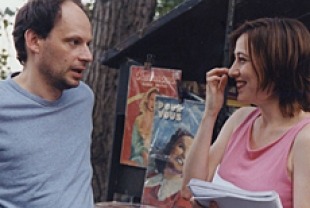Federica (Valeria Bruni Tedeschi) grew up a privileged child in Italy where her father was very successful. As a little girl, she enjoyed her playtime fantasies and always took the lead in orchestrating them. The family moved to Paris in the 1970s and since then, Federica has felt burdened with all the money she possesses.
In the opening scene of the film, this thirtysomething woman seeks out a priest (Pascal Bongard) to talk about her guilt and anxiety. She wants to meet with him on a regular basis but he has no intention of becoming her therapist. He quotes the passage in Matthew: "It’s easier for a camel to go through a needle than for a rich man to enter heaven." But Federica's worries are about her life on earth and a recent downward spiral of events.
She has a love relationship with Pierre (Jean-Hughes Anglade) that seems to have stalled, and there is obvious friction between them over her wealth. Federica writes plays as a hobby but her latest one is criticized by a director who says it is not up to her usual standard. Then she bumps into Philippe (Denis Podalydes) on the street; she had an affair with him, even though he is married, and she's never gotten over it. They have sex and spend some time together but nothing has changed; he has no intention of leaving his wife. Another downswing takes place when Federica's elderly father (Roberto Herlitzka) is hospitalized, and the doctor tells the family that he is dying. She is his favorite daughter, and her sister Bianca (Chiara Mastroianni) has not forgiven her for this competitive victory. Federica's mother (Marisa Borini) has been depressed for some time and has a difficult time with both of her daughters. Aurelio (Lambert Wilson), the son, returns from an around-the-world trip to be with his father. Federica sees in him what most frightens her about her possible future: a bored person who doesn't work and selfishly spends money on frivolities.
Valerie Bruni Tedeschi directs this French drama from a screenplay she wrote with Noemie Lvovsky. Considering the large numbers of very wealthy people around the world, it is refreshing to see a drama about one of their number who is troubled by her position and struggling to find a way to live a moral life. There is a bit of a dabbler in Federica who takes ballet lessons and still resides in the dreamy world of childhood. When she criticizes her brother for his hedonistic lifestyle, he ridicules her for placing herself above her family as if she were better than them. In the end, Federica discovers that her real wealth lies in her imagination and its robust energy.
